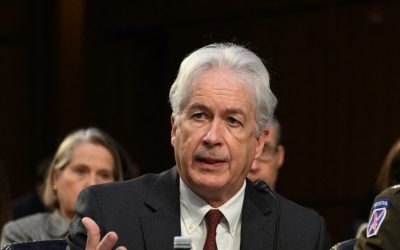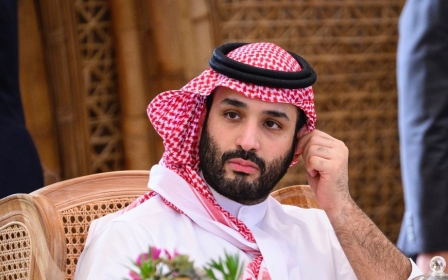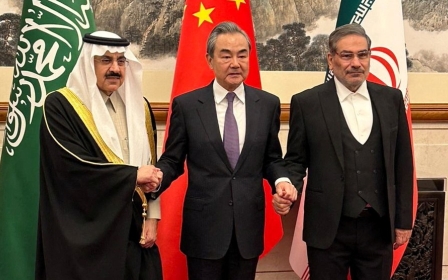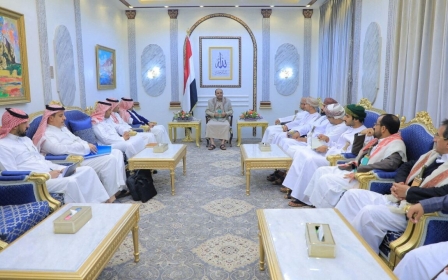Saudi Arabia's crown prince meets senior US officials amid independent policy streak
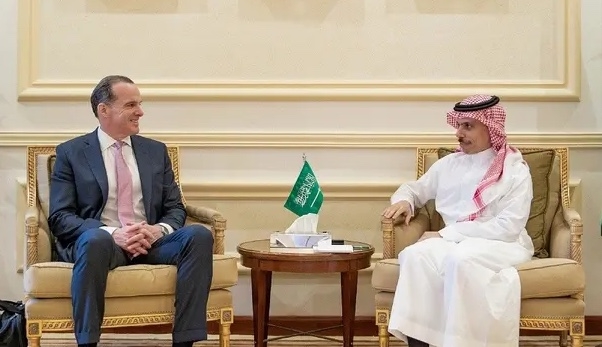
US President Joe Biden's top advisor on the Middle East, Brett McGurk, and energy envoy Amos Hochstein met Crown Prince Mohammed bin Salman in Saudi Arabia this week, as the kingdom pushes ahead with an independent foreign policy streak that has irritated Washington.
The meeting, first reported by Axios, comes two days after US National Security advisor Jake Sullivan spoke to Mohammed bin Salman to discuss Yemen and Iran.
Sullivan said the US “welcomed Saudi Arabia’s extraordinary efforts to pursue a more comprehensive roadmap for ending the war [in Yemen] and offered full US support for those efforts”, the White House said in a statement.
Middle East Eye reached out to the White House for comment.
McGurk and Hochstein also met Saudi Foreign Minister Prince Faisal bin Farhan in the Saudi port city of Jeddah. Saudi Arabia’s ambassador to the US, Princess Reema bint Bandar, also attended the meeting, according to Saudi Arabia’s foreign ministry.
New MEE newsletter: Jerusalem Dispatch
Sign up to get the latest insights and analysis on Israel-Palestine, alongside Turkey Unpacked and other MEE newsletters
Tim Lenderking, the US special envoy for Yemen, attended the meeting with Mohammed bin Salman.
The visit by top US officials comes amid signs of frustration in Washington over Saudi Arabia’s independent foreign policy streak, and several days after US Senator Lindsey Graham visited the country and met with the crown prince.
“I just had a very productive, candid meeting with the Saudi Crown Prince and his senior leadership team,” Graham said in a tweet on Tuesday. “The opportunity to enhance the US-Saudi relationship is real and the reforms going on in Saudi Arabia are equally real.”
The visit marks a reversal of his previous stance on Saudi Arabia from several years ago, when he vowed never to work with Riyadh as long as Mohammed bin Salman was in charge, following the murder of Washington Post and Middle East Eye columnist Jamal Khashoggi.
Saudi Arabia 'blindsides' CIA
CIA director Bill Burns was in the kingdom at an undisclosed time earlier this month, according to the Wall Street Journal. He told Mohammed Bin Salman that Washington felt "blindsided" by Riyadh’s efforts to restore ties with Iran and, more recently, Syria.
The alleged comments by the US spy chief contradict the official US position that Riyadh kept Washington up to date on talks to reestablish diplomatic relations with Iran which were brokered by Washington’s arch-rival, China.
Former US officials and analysts previously told Middle East Eye that Yemen will be a major indicator of the deal’s success.
A Saudi-led coalition intervened in Yemen's civil war in March 2015, with the aim of crushing Iran-aligned Houthi rebels.
Despite launching thousands of air strikes on the impoverished country, the coalition was unable to oust the Houthis, who control the capital Sanaa along with most major urban centres. Saudi Arabia has been trying to extricate itself from the conflict.
A Saudi delegation left the Yemeni capital on Friday, following four days of ceasefire talks with the Houthis.
Ending the war in Yemen is also a key foreign policy goal of the Biden administration. Lenderking told MEE last year that the US was “encouraging” talks between Iran and Saudi Arabia, particularly if these could address the kingdom's security concerns in Yemen.
Elsewhere, Saudi Arabia is pressing ahead with efforts to bring Syrian President Bashar al-Assad in from the cold in the lead-up to an Arab League summit it is hosting in May.
But Riyadh is facing pushback from at least five members of the group - including Morocco, Kuwait, Qatar and Yemen - who have refused to readmit Syria without concessions from Damascus on dialogue with the opposition, right of return for refugees, and curtailing Iran's activities, the Wall Street Journal reported.
At the same time, Saudi Arabia is pressing ahead with efforts to capitalise on what many analysts say may be one of the world’s last great oil booms, while shrugging off US concerns in the process.
Earlier this month Riyadh corralled fellow Opec members to enact a “voluntary” cut in crude production by nearly 1.2 million barrels a day. The International Energy Agency said on Friday that the move would worsen a global oil deficit, driving inflation higher.
The announcement scorched speculators who had bet on prices dropping amid economic headwinds and further underscored the breakdown of Riyadh’s energy-for-security pact with Washington.
Saudi Arabia is using its windfall in oil revenues to pursue mega-projects like the futuristic city of Neom and a new airline, which are designed to diversify its economy away from a reliance on fossil fuels.
Middle East Eye delivers independent and unrivalled coverage and analysis of the Middle East, North Africa and beyond. To learn more about republishing this content and the associated fees, please fill out this form. More about MEE can be found here.


